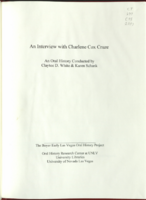Search the Special Collections and Archives Portal
Search Results

Transcript from interview with Helen Anderson and Karen Walker by Claytee White and Barbara Tabach, February 21, 2014
Date
Archival Collection
Description
Helen Anderson came to Las Vegas in 1962 from Arkansas, and had her daughter, Karen, in 1967. The pair discusses the family business, Hamburger Heaven, and other businesses on Jackson Street and the Westside. They also talk about hte changes in the neighborhood and their work with the West Las Vegas Citizens for Hope group, and Karen's family services business.
Text
Audio clip from interview with Helen Anderson and Karen Walker, February 21, 2014
Date
Archival Collection
Description
Part of an interview with Helen Anderson and Karen Walker, February 21, 2014. In this audio clip, Anderson and Walker (mother and daughter) discuss how their family came to own Hamburger Heaven, and the food they served, including desserts.
Sound

Transcript of interview with Charlene Cox Cruze by Claytee D. White and Karen Schank, August 9, 2010
Date
Archival Collection
Description
The Las Vegas story of Charlene Cox Cruze begins long before she was born in 1941. Her early ancestors had traveled through the area in the 1850s and her grandparents settled in Las Vegas in 1905, the year of incorporation as a town. She is a registered native American and Daughter of the American Revolution. Char recalls growing up in the valley when it had: a "forest of mesquite", plenty of water and atomic bomb tests. Her family's first home was a structure built on a flatbed that her father pulled behind a truck wherever he had work. In this narrative Char touches upon the memories of being a youngster playing in the dust to riding a horse across the desert, swimming in the pool at the Flamingo and seeing celebrities like Elvis Presley and Nat King Cole perform. She also offers her thoughts about the transformation of Las Vegas from a small city to the modern corporate era of the Strip.
Text

Transcript of interview with Stan Irwin by Cork Proctor, October 24, 2003
Date
Archival Collection
Description
Stan Irwin shares details of his background, family, and early show business experiences. His life story spans many decades and includes attending NYU, doing stand-up comedy, flying during WWII, working at Club Bingo in Las Vegas, and building up the entertainment at the Sahara Hotel. Mr. Irwin comments on many aspects of the Las Vegas entertainment scene. He recalls many headliners that he worked with and shares anecdotes about several. The Beatles, Johnny Carson, Dinah Washington, Billie Holliday, Lena Home, and Pearl Bailey are just a few of the many outstanding performers that he brought to Las Vegas. Stan offers comments on racism in Las Vegas thirty and forty years ago, and gives his opinions on the Mob, Howard Hughes, prostitution, and dress codes in the fifties and sixties, among other things. He recalls how Las Vegas looked in the early days, mentions a cardiovascular health project for children that he's involved with today, and gives a little insight into staying fit at eighty-plus.
Text

Transcript of interview with Charles T. "Blackie" Hunt by Cork Proctor, July 3, 2003
Date
Archival Collection
Description
Charles T. "Blackie" Hunt, born in Pottstown, Pennsylvania in 1930, started accordion lessons at age five. He recounts learning from experienced musicians, then teaching others at age twelve because his teacher was drafted. He attended West Chester State Teachers College where, among other accomplishments, he put together a group with Nick Carlino as tenor sax player. Blackie shares detailed memories of the many musicians with whom he worked and toured. They played in venues that included Harrisburg, Toronto, and Montreal, and eventually were offered a booking at the Sahara Hotel in Las Vegas. The group that Blackie worked with in Las Vegas, Tahoe, and Reno came up with the name "The Characters" (backward 'e'), and the show featured comedy and music. It was during this time that he met Lorraine (stage name Lauri Perry), who had her own group. They were married after a couple of years and Lauri joined The Characters. Blackie and Lorraine Hunt opened Blackie's Bar on Tropicana and Eastern Avenues in the seventies. He talks about the jazz sessions that took place and the musicians who sat in on them, and how he and Lorraine eventually decided to bow out of show business themselves. The Hunts went on to open the Bootlegger, a restaurant/piano bar on Las Vegas Boulevard. They started a little comedy/music session called "Off the Cuff', in which local or touring musicians, comedians, and singers often participate. Blackie and Lorraine have been part of the vibrant history of Las Vegas and the state of Nevada for many years, and continue to make their home here.
Text

Transcript of interview with Herb Jeffries by Cork Procter, May 5, 2009
Date
Archival Collection
Description
Herb Jeffries, a renaissance man, loved life and lived it well. A consummate professional, Jeffries excelled as a singer, actor, businessman, and lover of the finer things in life. He appreciated good literature, art, culturally-diverse food selections, freedom, and worthwhile conversation. The pioneering black singing cowboy, was born Umberto Valentino in Detroit, Michigan on September 24, 1913. His career as an entertainer began as a teenager in Chicago, singing with Earl “Fatha” Hines. Next came the movie career and then back to the stage in 1939 with the Duke Ellington Orchestra. By the early 1950s, he had moved to France and opened a popular jazz club in Paris and another in southern France. According to this interview, these clubs drew “beautiful people” from all over the world. Jeffries’ career moved from performances in the American South restricted to tobacco warehouse and black-only movies theatres to starring in numerous movies leading ultimately to a star on the Hollywood Walk of Fame. The most famous of his five wives was Tempest Storm the burlesque star and motion picture actress. Herb Jeffries made his transition, leaving behind his fifth wife, at 100 years of age on May 25, 2014.
Text

Transcript of interview with Bobby Morris by Cork Proctor, September 7, 2004
Date
Archival Collection
Description
This interview conducted by Cork Proctor and is part of the Arnold Shaw Collection at UNLV University Libraries Special Collections. It has been added to the Southern Nevada Jewish Heritage Project with Mr. Morris?s permission. In this conversation, Morris reflects upon his career, how he got started as a musician, and the wide range of influential artists he has worked with over the years, as a drummer, musical director and talent manager. Stories include playing with Louis Prima, live and on his albums; serving as Elvis? musical director; filling in for Frank Sinatra?s drummer; entertaining Howard Hughes; and playing at President John F. Kennedy?s inauguration.
Text
Audio recording clip from Interview with Barbara Kirkland
Date
Archival Collection
Description
Part of an interview with Barbara Kirkland by Claytee White on November 12, 2004. Kirkland discusses the growth of the Alpha Kappa Alpha (AKA) sorority since 1960 and the different projects and scholarships they have worked on throughout the years.
Sound

Transcript of Interview with Barbara Kirkland
Date
Archival Collection
Description
On a sunny day in 1946, the train from Shreveport, Louisiana, stopped at The Plaza hotel in downtown Las Vegas like it always did. But on this particular day, Atha Toliver and her only child, twelve-year-old Barbara, stepped off the train and onto the dusty Western street of Fremont. Narrator Barbara Bates Kirkland recalls that event and living in Las Vegas for most of the next seven decades during this 2004 interview. Like many others who migrated from the South, Barbara Kirkland’s mother would find employment as a maid. A friend who already lived in Las Vegas had told her of the good paying jobs as private maid. So Atha who was determined that her daughter would get an education and a finer future saw this as her opportunity to achieve this for her daughter. Later, the entrepreneurial and creative mother opened Eva’s Flower Basket, a floral shop that Barbara operates in her retirement from teaching. Barbara returned to Louisiana for her senior year in high school, attended Southern University in Baton Rouge, and then returned to Las Vegas to teach first grade at Westside School. Barbara was active in the community, was a founding member of Les Femmes Douze, involved with Zion United Methodist Church and was friends with many of the early African American community leaders at the time. She talks about these, describes various neighborhoods where she lived and about raising her own two children in Las Vegas. Barbara was a founding member of Les Femmes Douze. AKA/Akateens.
Text
